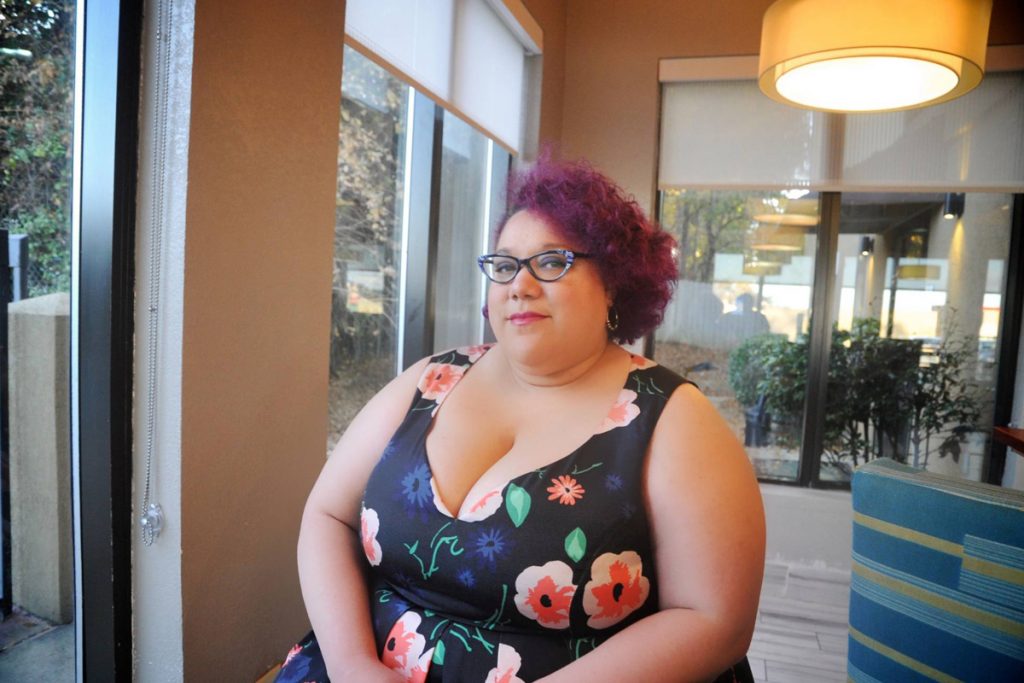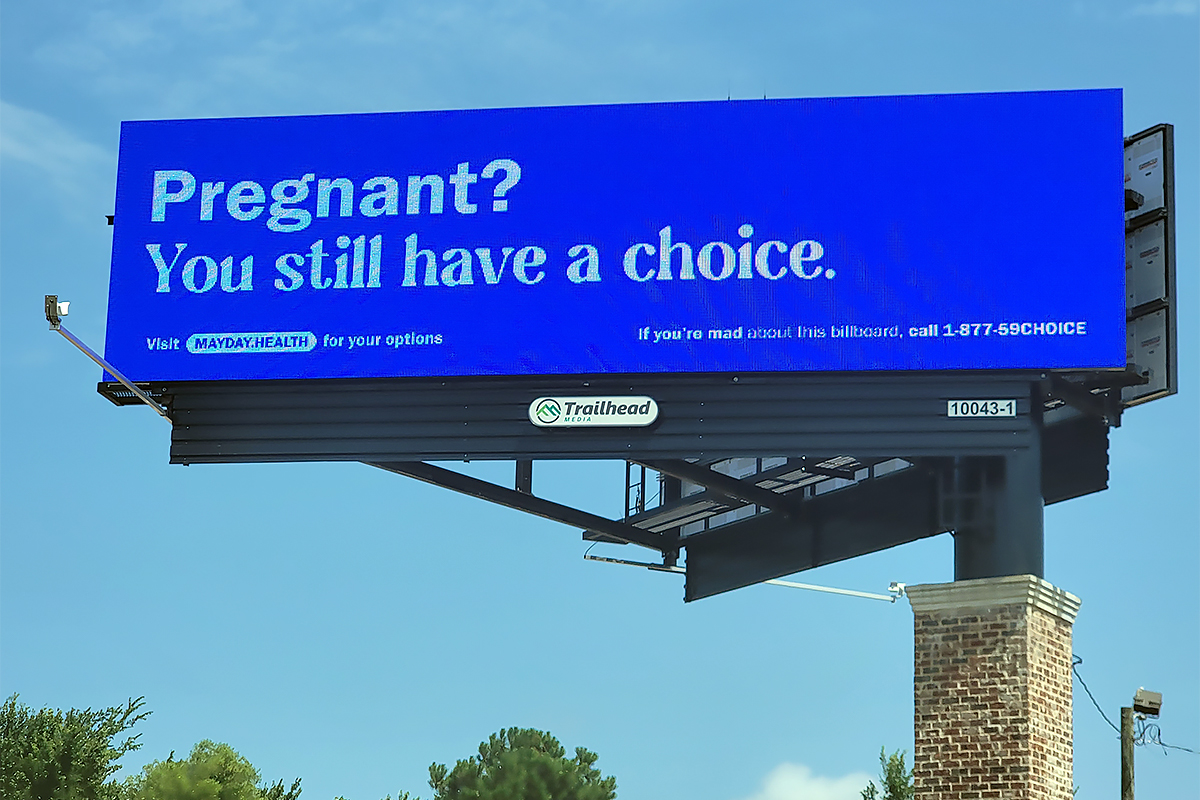Now that Mississippi’s only abortion clinic has shut its doors permanently, an advocacy group is erecting billboards on highways around the capital city region to inform residents of the availability of telemedicine-prescribed abortion pills from doctors outside Mississippi. The billboard’s sponsors say mail-order abortion pills remain a possible option for Mississippians seeking abortions in the first trimester.
But expert observers warned the Mississippi Free Press that such services exist in a legally gray area.
While individual self-managed abortions are not a criminal violation of Mississippi’s ban on providing abortions, prosecutors in other states have used prohibition laws in the past to criminalize self-induced abortions and stillbirths. Additionally, abortion advocates warn that individuals must consider their health risks and access to medical care in the case of complications in spite of robust safety data for medication abortion.
‘You Still Have Access By Mail’
Mayday Health, an nonprofit based in Delaware, is putting up billboards in West Jackson and Richland, south of Jackson, to inform residents that alternative methods of abortion access still exist.
Olivia Raisner, co-founder and creative director of Mayday Health, told the Mississippi Free Press in a July 19 interview that too few people are aware of safe medical avenues to abortion like mifepristone and misoprostol. Until January 2022, Raisner served in the Biden White House as traveling content director and, previously, worked for Hillary Clinton’s presidential campaign.
“Even in a state with an abortion ban, you can still have access to abortion pills by mail,” Raisner said. “These are FDA-approved abortion pills, and only something like one in 10 Americans even know they exist. We want to spread the word so that pregnant people can make the best decision about their reproductive health.”
Elizabeth Ling is senior helpline counsel at If/When/How, a national reproductive-justice organization that provides a free, private helpline service that provides legal information regarding self-managed abortions. In an interview with the Mississippi Free Press, Ling stressed that in many states in the U.S., the laws governing abortions, including abortion pills, represent a complex legal gray area.
“Legal risk often depends on a number of factors that are unique to an individual and their situation,” Ling said. “Because laws are changing so quickly, these days I would say the best thing for Mississippians to do if they are considering this option is to call our helpline.”
Ling highlighted the difference between telemedicine abortions and self-managed abortions. While telemedicine abortion remains legal in many states across the U.S., self-managed abortion is “when people choose to end a pregnancy outside of the formal health-care system in the United States.”
Technically Not Criminalized
Ling said explained self-managed abortions are not criminalized under the laws that have ended formal access to abortion services in Mississippi. But that does not mean that no legal risk exists.
“Most abortion bans, including the one in Mississippi, are a ban on providing or performing abortion. They don’t actually criminalize the person who would have the abortion,” Ling explained. “But even before Roe was overturned, when abortion was a constitutional right in all 50 states, we do know that law enforcement and prosecutors have misused laws to criminalize people for their pregnancy outcomes in the past.”
Mississippi’s trigger law explicitly criminalizes “any person, except the pregnant woman, who purposefully, knowingly or recklessly performs or attempts to perform or induce an abortion in the State of Mississippi,” except in cases of incest or rape, or to save the life of the mother. Mississippi Republicans and Democrats in the Legislature passed the trigger bill in 2007, and Gov. Haley Barbour signed it into law.

Ling concluded that individuals seeking abortions or seeking to help others obtain an abortion in states like Mississippi where abortion is illegal should reach out to services like the Repro Legal Healthline to assess their individual risk and rights, rather than assuming abortion laws simply do not apply to non-providers.
“The bottom line is that, regardless of what the law has said … laws have been misused to criminalize people for their pregnancy outcomes,” Ling said.
Raisner was quick to state that Mayday Health does not offer legal or medical advice. “We are not selling them, handling them or benefiting from the sale of them,” she said. “We are spreading information.” Mayday Health’s website links to national abortion telemedicine services like Just The Pill and Plan C, where individuals can seek consultations for abortion-pill access from other states and even nations abroad.
But Mississippians seeking access to mifepristone and misoprostol can only acquire them outside the state. This is where telehealth comes into play. Mayday’s website links to numerous telehealth services, where Mississippi can receive online consultations in search of a prescription for abortion medication.
After receiving an online consultation, Mayday encourages Mississippians to use mail-forwarding services to privately order and receive the medications. While health-care access matters, Raisner says privacy is one of Mayday’s top concerns.
“We do not collect information from anyone who visits our site. We don’t collect IP addresses, cookies. We don’t even have a donate button, so we’re not collecting emails. On our website, along with a reproductive health link, there’s also a link for resources on how to protect your digital privacy,” Raisner said.
Ling, too, stressed the need for careful privacy measures. “People can take steps to protect their privacy through digital safety practices,” she said. “If they have questions about that, they can also call us on our helpline.”
‘They’d Wanna Do Their Homework’
While Mayday’s website, advertised in bold letters on the billboards, does not directly offer abortion-pill services, it lists information on nonprofits and national entities that do provide those services. Raisner referenced the same helpline for which Ling serves as counsel.
“There is an excellent resource that we link at the very top of our website, it’s called the Repro Legal Healthline. It provides (access to) free, private legal advice from experts,” Raisner said. Mayday also provides links to medical data from the Guttmacher Institute, which highlights the safety of the available abortion pills.
“Evidence shows that medication abortion is safe,” the Guttmacher article states, linking to dozens of studies to evidence this. “Serious complications requiring hospitalization for infection treatment or transfusion occur in less than 0.4% of patients under the standard protocol. Medication abortion is highly effective; it has a success rate of more than 95% using the standard protocol.”

Abortion-rights organizers and activists like Laurie Bertram Roberts, co-founder of the Mississippi Reproductive Freedom Fund, warn that precautions are necessary, especially in the context of self-managed abortions.
“If you have a bleeding disorder, you shouldn’t self-manage your abortion. If you have an IUD in you shouldn’t self-manage your abortion,” she continued. “(It can be dangerous if) you are too far away from a hospital, like more than 30 or 45 minutes away so that you couldn’t get emergency help if you needed it.”
Above all else, Roberts warned that anyone considering self-managed care should first seek to deeply inform themselves of the risks and procedures involved. “They’d want to do their homework,” she said.
Roberts highlighted the World Health Organization protocol for self-managed abortions as a critical source of information.
Prohibiting ‘Essentially All Abortion Care’ in State
Previously, the Mississippi Center for Justice challenged the state’s abortion bans that outlawed the medical procedure in the state on the basis that the Mississippi Supreme Court previously found that abortion rights are protected as an indirect consequence of privacy rights.
But last week Diane Derzis, formerly the owner of the Jackson Women’s Health Organization, sold the Pink House and with it closed the door, for now, on abortion clinics in Mississippi. With the disappearance of the Jackson Women’s Health Organization, Rob McDuff, director of the George Riley Impact Litigation Initiative for the Mississippi Center for Justice, said in a statement that his organization no longer has standing to challenge the abortion ban.
Mississippi’s trigger ban “prohibited the provision of essentially all abortion care in the state,” McDuff wrote, after which “the Mississippi Supreme Court then declined to hear our appeal on an emergency basis. Diane Derzis, the clinic’s owner, has now sold the clinic’s building in light of the dim prospects for a speedy and meaningful ruling that would allow the clinic to reopen. Accordingly, we have dismissed our case on the clinic’s behalf. If the clinic is not in a position to reopen in Mississippi, it no longer has a basis to pursue this case in the courts.”
Derzis announced that she is immediately moving equipment to a new clinic in Las Cruces, N.M. That leaves two options for Mississippians seeking abortions—travel to another state for the service or seek pills delivered from abroad.
The Mississippi Free Press sought precise legal advice on the status of abortions, including self-managed abortions, for this story. But many expert legal observers were hesitant to share concrete conclusions with this reporter, citing the rapidly evolving legal landscape.
‘Physicians Should Be Very Concerned’
The future of access to abortion pills by mail is unclear. Already, some states are attempting to crack down on the practice, with Louisiana now banning out-of-state providers from prescribing abortion medication to state residents.
“The bill creates the crime of ‘abortion by means of an abortion-inducing drug,’” reporter Piper Hutchison wrote in the Louisiana Illuminator, “which includes delivering, dispensing, distributing or providing abortifacients when the person administering the medication is not a physician licensed in the state.”
Mississippi’s Gov. Tate Reeves has made several media comments on the possibility of mail-ordered abortion pills. On July 3, Fox News’ Mike Emanuel asked Reeves directly if Mississippi’s broad abortion bans might include surveillance to prevent remote prescription of abortion pills. “Should women in Mississippi be concerned about surveillance of their mail or their phones?” Emanuel asked.
“I have no reason to believe that there will be any surveillance of mail or phones,” Reeves replied. “But I do think that if physicians are practicing medicine in our state without a license, then those physicians should be very concerned about doing so.”
Reeves added that this practice of medicine made any providers subject to state law, which firmly bans the practice of medication abortion. “Whether through telemedicine or otherwise … any physician that practices in our state is practicing not only based upon the standards of care that we require in our state, but also state law,” Reeves told Emanuel.
The Mississippi Free Press reached out to the office of Mississippi Attorney General Lynn Fitch for comment and did not receive an immediate response.
Senior reporter Ashton Pittman contributed to this story.






